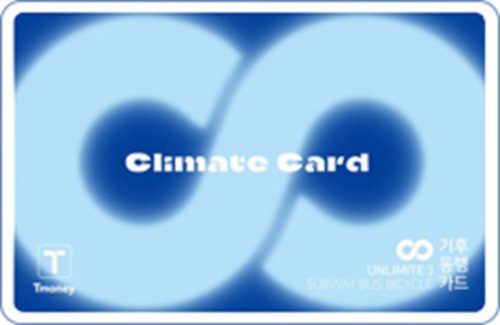
Background
The Seoul Metropolitan Government has been striving to expand eco-friendly transportation infrastructure, exemplified by the introduction of the nation’s first “Integrated Public Transport Fare System” in 2004. However, following the COVID-19 pandemic, the use of private vehicles increased while public transportation usage declined, necessitating new measures to revitalize public transportation. Additionally, since the transportation sector accounted for approximately 17% of Seoul’s total greenhouse gas emissions in 2022, the city decided to introduce the proactive policy “Climate Card” to reduce these emissions.
Climate Card Project
The Climate Card is a transportation card that allows unlimited use of subways, buses, and public bicycles (Seoul Bike) within Seoul. Following a pilot project from January to June 2024, full-scale implementation will begin in July. During the pilot phase, only a 30-day pass (KRW 65,000, about USD 47) was available. However, starting with the full-scale implementation, short-term passes for tourists (1, 2, 3, 5, and 7 days) will also be introduced.
The Climate Card expands the usage scope and significantly improves the convenience of the existing urban rail passes, which were limited to subways, by integrating and connecting various modes of transportation for unlimited use. Notably, it includes the eco-friendly public bicycle, Seoul Bike. By connecting public transportation with Seoul Bike, residents in areas with insufficient subway or bus routes can easily access subway stations or bus stops using the bikes, helping to eliminate public transportation blind spots. Starting in October 2024, water buses navigating the Hangang River (Hangang River Bus) will also be included, with plans to further expand to new next-generation transportation modes.
Expected Outcomes
The objective of launching the Climate Card, which offers more competitive benefits than private vehicles, is to reduce private vehicle usage and consequently decrease greenhouse gas emissions in the transportation sector. According to a survey conducted in March 2024 with 2,823 users, 4% of respondents reported switching from regular use of private vehicles to public transportation. Based on an estimated 500,000 weekday users, this is equivalent to reducing the use of 1,100 private vehicles and cutting monthly greenhouse gas emissions by 1,800 tons.
Project Costs
• Estimated annual budget: Approximately $131,819,846
• Expected annual reduction in traffic congestion costs:
• Approximately $732,332,479
Project Cost Discussion
The implementation of the Climate Card project is expected to reduce societal costs, specifically traffic congestion costs in Seoul, by approximately $732,332,479 annually (estimates).
▸ Passenger car modal share rate: 28.5% in 2020, 38.0% in 2021
▸ Passenger car traffic congestion costs in Seoul: $6,883,925,302 in 2020, $7,938,484,071 in 2021
– A 33% increase in the passenger car modal share rate results in a 15% increase in traffic congestion costs.
– Based on this ratio, it is estimated that if the Climate Card project reduces the passenger car modal share rate by 20% and traffic congestion costs by 9%.
– Therefore, an estimated $732,332,479, or 9% of 2021 passenger car congestion costs in Seoul, will be saved.
Emissions
Annual reduction in greenhouse gas emissions: 32,000 tons
Emissions Calculation Discussion
Expected annual reduction in greenhouse gases by 32,000 tons due to a decrease of approximately 13,000 passenger cars (estimates)
▸13,000: Approximately 500,000 expected users × 24% of passenger car modal share* × 20% reduction in use* / 1.82 passengers per car
* 20% reduction in use: Decrease in weekend usage
* 24% of passenger car modal share (using 2019 figure to exclude COVID-19 impact)
**Source: Joint Census Project on Origin-Destination (O/D) Passenger Traffic in Metropolitan Area 2022 (Dec. 2022)
▸32,000 tons: 13,000 vehicles × 2.45 tons of greenhouse gas emissions per car
– 31,886 ton/year = 13,000 vehicles × 0.21 kg CO₂/km × 32 km/ day per vehicle × 365 days/year × 1 ton/1,000 kg
Fuel Displacement
Annual savings in gasoline consumption: Approximately 15,184,000 liters
Fuel Displacement Calculations Discussion
Expected decrease in passenger car usage: Approximately 13,000 cars per year, leading to an annual savings of about 15,184,000 liters of gasoline consumption
▸ 15,184,000 L = (13,000 vehicles × 32 km/day per vehicle × 365 days)÷10 km/L (average fuel displacement of gasoline cars)